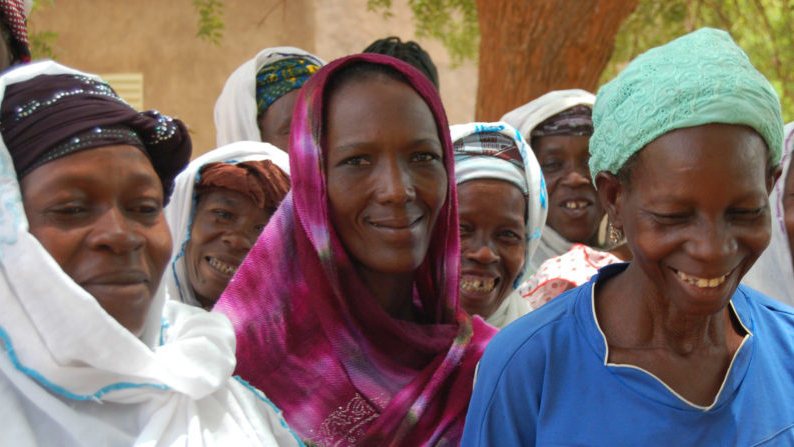When Téné Sawadogo heard that her 16-year-old daughter Wendkuni planned to marry soon, she knew it was important that Wendkuni stay in school.
Téné lives with her five children, husband, co-wife, and their three children. Two of her five children are in school. Téné is one of 15 participants in Trickle Up’s program in Barga, Burkina Faso. She was selected as a participant because her family lives in extreme poverty and relies entirely on their agricultural activities for survival.
With her Trickle Up grant, she started a new business manufacturing and selling caramel candy to students at nearby schools. After just four months, Téné was making an average of $25 a month. During the schools’ summer vacation, she sold coffee to agricultural workers, earning an average monthly income of $17, and resumed her caramel stand when school started again. The profits have enabled her to start raising livestock, and she now owns four sheep and ten chickens.
Despite the difficulties of paying for educational expenses, Téné has been trying to ensure all of her five children attend school. Thanks to this stable income, Téné is better able to manage school expenses.
Her hard work to pay for school is one of the reasons it is so important to Téné that Wendkuni, who is in 6th grade, not give up her studies.
In spite of her mother’s efforts, the difficult economic conditions of her household led Wendkuni to seek marriage and become involved with a young man who mined for gold at the sites near Barga. When he planned to leave for Guinea to try his luck at other mines, he proposed to Wendkuni and she accepted. Appalled by the decision, Téné quickly decided to involve others in her effort to encourage Wendkuni to pursue education instead of marriage.
At her weekly savings group meeting, Téné expressed her concern to the group, who advised her to seek the help of their coach, Mrs. Traore. Téné’s savings group is one of eight groups taking part in a randomized controlled trial receiving a combination of Graduation (Trickle Up’s economic development program) and an awareness program promoting children’s rights. Selected households attend monthly awareness sessions on five themes: educating children, child trafficking, violence and abuse against children, forced and early marriage, and child beggars. These sessions are done as a group with the participation of community leaders, as well as individually at each participant household where all family members are present.
Because of these sessions, the savings group knew that early marriage is a threat to girls’ education. They discussed with Mrs. Traore how they could engage with Téné’s household to find a solution that would keep Wendkuni in school. The management committee and Mrs. Traore met with various members of the family, including Téné, her husband, her co-wife, and Wendkuni’s grandmother. These discussions, directed at Wendkuni, supported her parent’s vehement request that she remain in school and emphasized the harmful impact of early marriage on young girls’ development and education.
The leaders of the savings group came up with a proposal for Wendkuni, and local authorities were called to help formalize an agreement. Local officials and the president of the village council met with Wendkuni, her suitor, and her parents to discuss the arrangement.
To ensure Wendkuni continued attending school after her marriage, her suitor signed a contract agreeing enroll her in secondary school and cover the costs of her education.
Wendkuni’s wedding was celebrated at the end of the school year. She joined her husband in Ouahigouya, the capital of the North region located 35 km from Barga. There, she entered 7th grade in a private secondary school and her tuition was paid by her husband. The compromise arranged by Téné’s savings group ensures Wendkuni’s development and education, despite her choice to marry early. Trickle Up’s program in Burkina continues to teach members of savings groups about the negative impacts of forced and early marriage on young girls and the importance of a child’s education in breaking the cycle of poverty.



